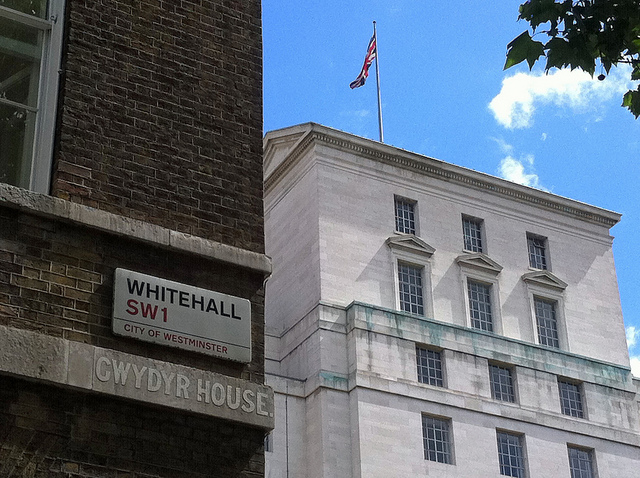A progress check on the role and influence of the Government’s departmental non-executive directors

Whitehall (Credit: Steph Gray, CC BY NC 2.0)
Sir Ian Cheshire became the lead government non-executive director (NED) in April, but, marking the launch of his Annual Report, he told an audience at the Institute for Government on 2nd July that his real work had started on 7 May, with the second phase of the NED “experiment”.
Government departments have had non-executive board members for many years, with their role being first publicly codified in 2005. The Coalition government enhanced the role of NEDs, and placed a greater emphasis on their having commercial experience (the 2010 Ministerial Code stipulated that they should be “largely drawn from the commercial private sector”), although as Cheshire noted, this was not the first government to try to bring advice from business people into government, as papers from Ted Heath’s government show.
NEDs now play an important advisory role in departments, Cheshire explained. The most obvious expression of this is through departmental boards, which are chaired by the secretary of state, and also attended by senior officials. Cheshire noted that the boards cannot be compared to corporate boards – although the official guidance has it that they provide “strategic leadership” of the department, in fact their role is advisory. They were nonetheless useful, he said, and provide an opportunity to step back and consider major departmental projects and capacity development. Cheshire and other NEDs had been shocked that while Boards received lots of management information, most of it was not actionable, and therefore of little value. This was an area where NEDs had helped departments make progress, for example by requiring that the board pack with management information comes out monthly even if the board itself only meets quarterly.
For someone with a private sector background, Cheshire admitted that government had a steep learning curve: “You can’t just walk into government, call everyone a muppet and tell them what to do.” But he stated that the NEDs provided useful advice for government across their range of specialisms – in DWP, the NED team had covered talent management, finance, and arm’s-length bodies. NEDs had particularly helped the government to enhance its risk management processes, which had been underdeveloped.
In providing advice, and in their role on departmental boards, the NEDs needed to speak truth to power, including encouraging realism from ministers about what could be delivered on what timetable. They needed to have substantial expertise that gave them credibility. They could not be “secret special advisers” or “cheap ministers”. While being a donor to a party in government should not exclude them from serving, it would not be appropriate for a working peer from a party in government to fill a NED role. In response to questions, Cheshire noted that the secretary of state appoints the NEDs (except the lead NED, who is appointed by the Prime Minister). The Lord Chancellor had therefore acted within the rules in replacing the NEDs at the Ministry of Justice. Although the optics were that he intended to appoint his own men and women, the one person he had so far appointed – Theodore Agnew – was independent-minded. There is an issue about continuity on the audit committee which Cheshire said he would follow up on.
Another important role for NEDs, which had been introduced in 2014, was in providing feedback on permanent secretaries’ performance. Cheshire explained how he chaired the remuneration committee for 30 permanent secretaries, making recommendations to the Prime Minister, and providing feedback on the Cabinet Secretary’s performance. Each lead NED provided feedback on their department’s permanent secretary. While permanent secretaries had initially been “sceptical” (in a Whitehall sense – i.e. hostile) about the NEDs’ new roles in 2010, they had come to be supportive of the system, including finding the NEDs’ performance feedback helpful.
Cheshire said his priorities were encouraging understanding across government of the role of NEDs – they didn’t offer a panacea, but could make a contribution and new ministers sometimes didn’t understand this; making sure that the quality of NEDs is maintained and enhanced (and there was a good pipeline); and supporting the central government agenda. This last priority involved supporting:
- talent selection and development in departments, respecting what the Civil Service was good at but also improving skills in commercial and digital functions, and supporting the development of leadership capacity. A small group of NEDs would focus on this.
- business plans, which was a short term task, and involves encouraging departments and government as a whole to focus on a small number of priority areas.
- the relationship between departments and arm’s-length bodies. The creation of some of these had involved contracting out political problems, which in times of austerity might need to be brought back into the department. The NEDs in arm’s-length bodies are an important network, and connections need to be made with departmental NEDs.
- The Major Projects Leadership Academy – project management capacity had increased in departments, but needs to go further.
- Risk management, which had been a cottage industry across Whitehall, and needs to get more serious.
Cheshire welcomed the opportunity to return to the Institute to provide an update on how his agenda was progressing.
—
This post originally appeared on the Institute for Government blog and is reposted with the permission of the author. It represents the views of the author, and not those of Democratic Audit or the LSE. Please read our comments policy before posting.
—
 Daniel Thornton joined the Institute for Government in April 2015, after more than two decades of experience in the UK and international public service. Daniel began his career in the Foreign Office, and subsequently worked in Parliament, the Treasury, the Cabinet Office, 10 Downing Street and as a Director in the Department for Communities and Local Government. From 2009 until 2015 he worked in Switzerland for Gavi, a public-private partnership that funds immunisation in developing countries. He leads on the IFGs Civil Service facing work.
Daniel Thornton joined the Institute for Government in April 2015, after more than two decades of experience in the UK and international public service. Daniel began his career in the Foreign Office, and subsequently worked in Parliament, the Treasury, the Cabinet Office, 10 Downing Street and as a Director in the Department for Communities and Local Government. From 2009 until 2015 he worked in Switzerland for Gavi, a public-private partnership that funds immunisation in developing countries. He leads on the IFGs Civil Service facing work.




 Democratic Audit's core funding is provided by the Joseph Rowntree Charitable Trust. Additional funding is provided by the London School of Economics.
Democratic Audit's core funding is provided by the Joseph Rowntree Charitable Trust. Additional funding is provided by the London School of Economics.
A progress check on the role and influence of the Government’s departmental non-executive directors https://t.co/784KSunXKG
What’s been the impact of bringing business people onto government department boards? @ifgevents https://t.co/v7xbf3NzcA
Optimistic view of outsiders’ role in Government. https://t.co/C2WIu7JAfR
Good summary of the role of the government NEDs. Big thanks for all their support and challenge. https://t.co/MLPFVCpzAA
A progress check on the role and influence of the Government’s departmental non-executive directors: Governmen… https://t.co/Tjjva19ksI
A progress check on the role and influence of the Government’s departmental non-executive directors https://t.co/URiflG8EFX #Option2Spoil
A progress check on the role and influence of the Government’s departmental… https://t.co/3xyB8xIMJY https://t.co/CTXhFOTVCb